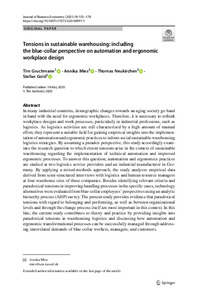| dc.date.accessioned | 2021-04-07T10:43:24Z | |
| dc.date.available | 2021-04-07T10:43:24Z | |
| dc.date.issued | 2020-05-14 | |
| dc.identifier | doi:10.17170/kobra-202103253595 | |
| dc.identifier.uri | http://hdl.handle.net/123456789/12693 | |
| dc.description.sponsorship | Gefördert im Rahmen des Projekts DEAL | ger |
| dc.language.iso | eng | eng |
| dc.rights | Namensnennung 4.0 International | * |
| dc.rights.uri | http://creativecommons.org/licenses/by/4.0/ | * |
| dc.subject | warehousing logistics | eng |
| dc.subject | automation | eng |
| dc.subject | ergonomics | eng |
| dc.subject | sustainability tensions | eng |
| dc.subject | human-technology interaction | eng |
| dc.subject | sustainable transformation | eng |
| dc.subject.ddc | 330 | |
| dc.title | Tensions in sustainable warehousing: including the blue-collar perspective on automation and ergonomic workplace design | eng |
| dc.type | Aufsatz | |
| dcterms.abstract | In many industrial countries, demographic changes towards an aging society go hand in hand with the need for ergonomic workplaces. Therefore, it is necessary to rethink workplace designs and work processes, particularly in industrial professions, such as logistics. As logistics activities are still characterized by a high amount of manual effort, they represent a suitable field for gaining empirical insights into the implementation of automation and ergonomic practices to inform social sustainable warehousing logistics strategies. By assuming a paradox perspective, this study accordingly examines the research question to which extent tensions arise in the context of sustainable warehousing regarding the implementation of technical automation and improved ergonomic processes. To answer this question, automation and ergonomics practices are studied at two logistics service providers and an industrial manufacturer in Germany. By applying a mixed-methods approach, the study analyzes empirical data derived from semi-structured interviews with logistics and human resource managers at four warehouse sites of these companies. Besides identifying relevant criteria and paradoxical tensions in improving handling processes in the specific cases, technology alternatives were evaluated from blue-collar employees’ perspectives using an analytic hierarchy process (AHP) survey. The present study provides evidence that paradoxical tensions with regard to belonging and performing, as well as between organizational levels and through the change process itself are most important in this context. In this line, the current study contributes to theory and practice by providing insights into paradoxical tensions in warehousing logistics and discussing how automation and ergonomic transformational processes can be successfully managed through addressing interrelated demands of blue-collar workers, managers, and customers. | eng |
| dcterms.accessRights | open access | |
| dcterms.creator | Gruchmann, Tim | |
| dcterms.creator | Mies, Annika | |
| dcterms.creator | Neukirchen, Thomas | |
| dcterms.creator | Gold, Stefan | |
| dc.relation.doi | doi:10.1007/s11573-020-00991-1 | |
| dc.subject.swd | Lagerung | ger |
| dc.subject.swd | Logistik | ger |
| dc.subject.swd | Automation | ger |
| dc.subject.swd | Ergonomie | ger |
| dc.subject.swd | Nachhaltigkeit | ger |
| dc.subject.swd | Transformation | ger |
| dc.subject.swd | Mensch-Maschine-System | ger |
| dc.type.version | publishedVersion | |
| dcterms.source.identifier | EISSN 1861-8928 | |
| dcterms.source.issue | Issue 2 | |
| dcterms.source.journal | Journal of Business Economics | eng |
| dcterms.source.pageinfo | 151-178 | |
| dcterms.source.volume | Volume 91 | |
| kup.iskup | false | |


